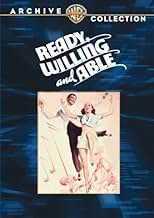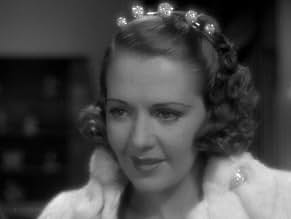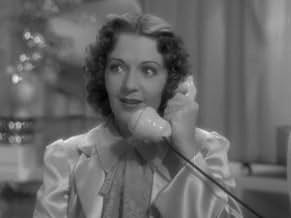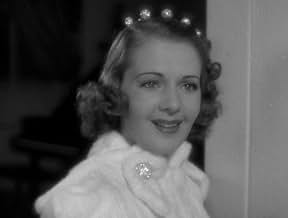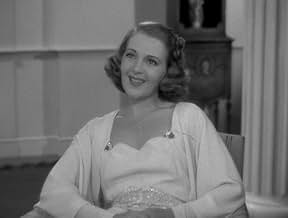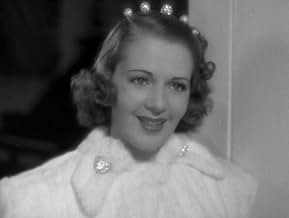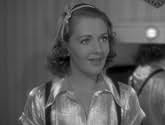Two songwriters want to cast a British star in their new show.Two songwriters want to cast a British star in their new show.Two songwriters want to cast a British star in their new show.
- Nominated for 1 Oscar
- 1 nomination total
Al Shaw
- Moving Man
- (as Shaw)
Sam Lee
- Moving Man
- (as Lee)
Lillian Kemble-Cooper
- Mrs. Buffington (Credits)
- (as Lillian Kemble Cooper)
- …
Featured reviews
Mistaken for a famous British singing star, an American college girl decides she's READY, WILLING AND ABLE to conquer Broadway - especially after meeting the young scriptwriter who's producing the play...
A fine example of the musical comedies which Warner Brothers seemed to produce so effortlessly during the 1930's, it's a shame this film has become so obscure. With good production values & a snappy storyline, it's still a pleasant entertainment. The major missing component is Busby Berkeley; the final production number, with Ruby Keeler & dancer Lee Dixon hoofing it upon the keys of a giant typewriter, fairly cries for the Master to send it over the top.
Pert & pretty, Miss Keeler is, as always, much fun to watch. Many of her scenes are given the added attractions of the lovely Carol Hughes, playing her best friend. Wini Shaw, as a singer with too much past & tart-tongued secretary Jane Wyman also contribute to the fun.
The comedy relief is largely handled by Allen Jenkins as a loudmouthed agent, Louise Fazenda as a faded Shakespearean actress & Hugh O'Connell as a society fuddy-duddy. Comic cameos by E. E. Clive & Lillian Kemble-Cooper as an English knight & lady, and Barnett Parker as a helpful British butler, are also welcome. Movie mavens will spot an unbilled Carlyle Moore Jr. as a dockside reporter.
Ultimately, though, there is sadness attached to this film. The leading man, Ross Alexander, shot himself before the film could be released. This was his final film; he was only 29. Born Ross Smith in Brooklyn in 1907, Alexander had the personality, talent & good looks which should have spelled significant stardom. But Hollywood is notoriously unpredictable, and Alexander, unhappy with the way his career was going & obviously still troubled by the gunshot suicide of his first wife in December of 1935, placed a pistol to his own head on January 2, 1937.
Once dead, it was Warner Brothers that paid him the final indignity. Having a completed film with a star who was not only deceased, but a suicide as well, was a bit more than the Studio wanted to deal with. So, cutting their losses, they gave Ross Alexander fifth place billing on the lineup of performers for READY, WILLING AND ABLE, where he should have received first or second.
Outside of his appearance in A MIDSUMMER NIGHT'S DREAM (1935), he is almost forgotten now. Ross Alexander was a victim of the Hollywood system and his own private anguish, each of which fed on the other. He should be remembered as a fine young actor, who, in a very few years, brought lots of enjoyment to movie audiences. This is typified by his best scene in READY, WILLING AND ABLE, where he introduces the Johnny Mercer lyrics for 'Too Marvelous For Words,' by gently reciting them to Ruby Keeler. It is a tremendously poignant few moments.
A fine example of the musical comedies which Warner Brothers seemed to produce so effortlessly during the 1930's, it's a shame this film has become so obscure. With good production values & a snappy storyline, it's still a pleasant entertainment. The major missing component is Busby Berkeley; the final production number, with Ruby Keeler & dancer Lee Dixon hoofing it upon the keys of a giant typewriter, fairly cries for the Master to send it over the top.
Pert & pretty, Miss Keeler is, as always, much fun to watch. Many of her scenes are given the added attractions of the lovely Carol Hughes, playing her best friend. Wini Shaw, as a singer with too much past & tart-tongued secretary Jane Wyman also contribute to the fun.
The comedy relief is largely handled by Allen Jenkins as a loudmouthed agent, Louise Fazenda as a faded Shakespearean actress & Hugh O'Connell as a society fuddy-duddy. Comic cameos by E. E. Clive & Lillian Kemble-Cooper as an English knight & lady, and Barnett Parker as a helpful British butler, are also welcome. Movie mavens will spot an unbilled Carlyle Moore Jr. as a dockside reporter.
Ultimately, though, there is sadness attached to this film. The leading man, Ross Alexander, shot himself before the film could be released. This was his final film; he was only 29. Born Ross Smith in Brooklyn in 1907, Alexander had the personality, talent & good looks which should have spelled significant stardom. But Hollywood is notoriously unpredictable, and Alexander, unhappy with the way his career was going & obviously still troubled by the gunshot suicide of his first wife in December of 1935, placed a pistol to his own head on January 2, 1937.
Once dead, it was Warner Brothers that paid him the final indignity. Having a completed film with a star who was not only deceased, but a suicide as well, was a bit more than the Studio wanted to deal with. So, cutting their losses, they gave Ross Alexander fifth place billing on the lineup of performers for READY, WILLING AND ABLE, where he should have received first or second.
Outside of his appearance in A MIDSUMMER NIGHT'S DREAM (1935), he is almost forgotten now. Ross Alexander was a victim of the Hollywood system and his own private anguish, each of which fed on the other. He should be remembered as a fine young actor, who, in a very few years, brought lots of enjoyment to movie audiences. This is typified by his best scene in READY, WILLING AND ABLE, where he introduces the Johnny Mercer lyrics for 'Too Marvelous For Words,' by gently reciting them to Ruby Keeler. It is a tremendously poignant few moments.
Ross Alexander was one of those unfortunates of life. He was good at the acting business and was given roles that would normally had gone to Dick Powell if he wasn't so busy. The trouble was that he was gay, and because of that in the 1930's, he took to the drink. He made "Ready and Willing" with Ruby Keeler in 1937 and then shot himself. His last picture doesn't stand out all that much as the story of "putting on a show" seemed to be a continuing serial throughout the '30's - but, he is quite good in it and delivers the main song "Too Marvelous for Words" first as a recitation and then in song - a couple of times - and his warbling is quite pleasing. Even though he was the leading man in this picture you can tell what the Warner Bros thought of him as his name is fifth on the list.
Ruby Keeler comes in as the love interest although that isn't clear at the start. She doesn't get to do all that much in the way of dancing about as in this picture as she is there for her acting ability. The plot maneuvers itself all over the place - there is mistaken identity, the putting on of a show, ineffectual fiancés, old ham actresses, actresses coming over from England, movie moguls, lyricists continually writing songs, Italians getting bamboozled and threatening landladies. Still, all this allows us to enjoy a few assorted character actors. Why there is even a short outing for two vaudevillians - Shaw and Lee in amongst E. E. Clive as a dimwitted Knight of the Realm, Barnett Parker as the quintessential English waiter, May Boley as the requisite fat landlady, the Romanian Adrian Rosley imitating Henry Armetta's typical Italian, Louise Fazenda as a ham actress who gets her Shakespeare all mixed up and Hugh O'Connell as whatever it is he is supposed to be. Without these characters doing their stuff the picture would have fallen quite flat.
As Ruby Keeler wasn't asked to sing, we are entreated to Wini Shaw coming in and doing that for her by way of a twist in the plot. She doesn't have all that much to do but her singing voice is a welcome addition. Also in lead roles we have Allen Jenkins as a theatrical agent, lowering the tone as per usual, Carol Hughes as Ruby Keeler's friend and Lee Dixon as Ross Alexander's theatrical partner. Also showing up briefly is Jane Wyman.
They don't make pictures like this anymore because everybody has now become too sophisticated and serious. Such a pity because it is pictures like these which are total frothy nonsense that I find highly entertaining and marvelous for taking one's mind away from the awful goings on in the world. It's fun and it's quite obvious from the finished product that everyone was having a rollicking good time making it.
Ruby Keeler comes in as the love interest although that isn't clear at the start. She doesn't get to do all that much in the way of dancing about as in this picture as she is there for her acting ability. The plot maneuvers itself all over the place - there is mistaken identity, the putting on of a show, ineffectual fiancés, old ham actresses, actresses coming over from England, movie moguls, lyricists continually writing songs, Italians getting bamboozled and threatening landladies. Still, all this allows us to enjoy a few assorted character actors. Why there is even a short outing for two vaudevillians - Shaw and Lee in amongst E. E. Clive as a dimwitted Knight of the Realm, Barnett Parker as the quintessential English waiter, May Boley as the requisite fat landlady, the Romanian Adrian Rosley imitating Henry Armetta's typical Italian, Louise Fazenda as a ham actress who gets her Shakespeare all mixed up and Hugh O'Connell as whatever it is he is supposed to be. Without these characters doing their stuff the picture would have fallen quite flat.
As Ruby Keeler wasn't asked to sing, we are entreated to Wini Shaw coming in and doing that for her by way of a twist in the plot. She doesn't have all that much to do but her singing voice is a welcome addition. Also in lead roles we have Allen Jenkins as a theatrical agent, lowering the tone as per usual, Carol Hughes as Ruby Keeler's friend and Lee Dixon as Ross Alexander's theatrical partner. Also showing up briefly is Jane Wyman.
They don't make pictures like this anymore because everybody has now become too sophisticated and serious. Such a pity because it is pictures like these which are total frothy nonsense that I find highly entertaining and marvelous for taking one's mind away from the awful goings on in the world. It's fun and it's quite obvious from the finished product that everyone was having a rollicking good time making it.
READY, WILLING AND ABLE (Warner Brothers, 1937), directed by Ray Enright, is a lightweight backstage story produced in late 1936 that marked the en of an era for Ruby Keeler as the tap dancing darling of Warner Brothers musicals. With Lee Dixon, Allen Jenkins and Louise Fazenda listed below Keeler's name, the main focus is actually on Ross Alexander, billed fifth in the casting credits. Sadly, upon completion of this musical, Alexander had committed suicide in January 1937, leaving one to wonder how far he could have gone in motion pictures, which began for him in 1932, followed by a Warner Brothers studio contract in 1934.
The plot in brief finds Barry Granville (Ross Alexander), a songwriter, actor and producer, who, along with Pinky Blair (Lee Dixon), hoofer and partner, hope to get their show, "Fair Lady" (no, NOT "My Fair Lady") produced on Broadway. McNeil (Addison Richards), an agent from Amalgamated Pictures, agrees to back the show if they can get a well known personality to appear in it. It is suggested they try to get Jane Clarke, an English musical-comedy star currently making headlines. They so happen to locate a Jane Clarke (Ruby Keeler), an aspiring dancer and student of Broadfield College returning home from England with her classmates. After the ship docks New York, she is approached and mistaken for the English singer by J. Van Courtland (Allen Jenkins), a theatrical agent sponsoring Granville. Jane is coaxed by her friend, Angie (Carol Hughes) to sign an immediate contract with Granville, feeling this would be her big opportunity to crash Broadway. Granville, of course, falls in love with his young "English" star, which makes it difficult for the guilt-ridden Jane to get enough courage to tell him the truth about herself. She does continue, however, with her masquerade, British accent and all. The jig is up, however, when the real Jane Clarke (Winifred Shaw) arrives from England after learning that she's to appear in a show she knows nothing about. However, the English Jane Clarke turns out to also be a fraud, which causes further conflict for Barry.
As with the latter MGM musicals that starred Mickey Rooney and Judy Garland in the late 30s/early 1940s, the cast in READY, WILLING AND ABLE is so energetic, especially Alexander and Jenkins, that it's ashame they couldn't rise above a mediocre script. Alexander's singing voice is obviously dubbed and Lee Dixon (who looks more like a movie cowboy than a Broadway hoofer) tap dances like a puppet on a string. An average score by Johnny Mercer and Richard Whiting includes: "The World is My Apple" (sung by Lee Dixon); "Handy With Your Feet" (sung and danced by Keeler); "Just a Quiet Evening" (sung by Alexander/ danced by Keeler and Dixon at dinner party), "Sentimental and Melacholy" (sung by Winifred Shaw); and the hit tune, "Too Marvelous for Words," which is plugged three times during the story, becoming the closing production number in which Keeler and Dixon tap dance on keys to a giant typewriter, compliments of choreographer Bobby Connolly, whose dance direction is usually mediocre at best. This production number was, however, nominated for an Academy Award for best dance direction. Aside from the song and dance, Louise Fazenda and Teddy Hart do a very familiar comedy routine during dress rehearsal, one that better served comedy team of Bud Abbott and Lou Costello in THE NAUGHTY NINETIES (Universal, 1945). Look for it. Featured in the supporting cast are Hugh O'Connell as Keeler's middle-aged but uninteresting fiancé, Truman Hardy; Shaw and Lee as the piano movers who do tap routines; Barnett Parker as a authentic English waiter; and a very young and cute Jane Wyman as a sharp-tongued secretary.
In spite of mistaken identity plot used numerous times in 1930s musicals, the best being GOLD DIGGERS OF 1933, READY, WILLING AND ABLE failed to become a classic. One of the few channels to have aired this musical at one point of time was WPHL, Channel 17, in Philadelphia, prior to 1974. Currently available on Turner Classic Movies, take notice whenever READY, WILLING AND ABLE is preceded by a three minute theatrical trailer that most of the major leads and their scenes are described and highlighted with the exception of Ross Alexander. His dubbed singing is heard, but is never seen.
On a personal level, the chemistry between Keeler and Alexander fails to register that certain spark and charisma Keeler made opposite Dick Powell in those seven musicals, and once opposite her overgrown husband Al Jolson. If remembered at all, READY, WILLING AND ABLE would be noted for its introduction to the popular tune of "Too Marvelous For Words." (**1/2)
The plot in brief finds Barry Granville (Ross Alexander), a songwriter, actor and producer, who, along with Pinky Blair (Lee Dixon), hoofer and partner, hope to get their show, "Fair Lady" (no, NOT "My Fair Lady") produced on Broadway. McNeil (Addison Richards), an agent from Amalgamated Pictures, agrees to back the show if they can get a well known personality to appear in it. It is suggested they try to get Jane Clarke, an English musical-comedy star currently making headlines. They so happen to locate a Jane Clarke (Ruby Keeler), an aspiring dancer and student of Broadfield College returning home from England with her classmates. After the ship docks New York, she is approached and mistaken for the English singer by J. Van Courtland (Allen Jenkins), a theatrical agent sponsoring Granville. Jane is coaxed by her friend, Angie (Carol Hughes) to sign an immediate contract with Granville, feeling this would be her big opportunity to crash Broadway. Granville, of course, falls in love with his young "English" star, which makes it difficult for the guilt-ridden Jane to get enough courage to tell him the truth about herself. She does continue, however, with her masquerade, British accent and all. The jig is up, however, when the real Jane Clarke (Winifred Shaw) arrives from England after learning that she's to appear in a show she knows nothing about. However, the English Jane Clarke turns out to also be a fraud, which causes further conflict for Barry.
As with the latter MGM musicals that starred Mickey Rooney and Judy Garland in the late 30s/early 1940s, the cast in READY, WILLING AND ABLE is so energetic, especially Alexander and Jenkins, that it's ashame they couldn't rise above a mediocre script. Alexander's singing voice is obviously dubbed and Lee Dixon (who looks more like a movie cowboy than a Broadway hoofer) tap dances like a puppet on a string. An average score by Johnny Mercer and Richard Whiting includes: "The World is My Apple" (sung by Lee Dixon); "Handy With Your Feet" (sung and danced by Keeler); "Just a Quiet Evening" (sung by Alexander/ danced by Keeler and Dixon at dinner party), "Sentimental and Melacholy" (sung by Winifred Shaw); and the hit tune, "Too Marvelous for Words," which is plugged three times during the story, becoming the closing production number in which Keeler and Dixon tap dance on keys to a giant typewriter, compliments of choreographer Bobby Connolly, whose dance direction is usually mediocre at best. This production number was, however, nominated for an Academy Award for best dance direction. Aside from the song and dance, Louise Fazenda and Teddy Hart do a very familiar comedy routine during dress rehearsal, one that better served comedy team of Bud Abbott and Lou Costello in THE NAUGHTY NINETIES (Universal, 1945). Look for it. Featured in the supporting cast are Hugh O'Connell as Keeler's middle-aged but uninteresting fiancé, Truman Hardy; Shaw and Lee as the piano movers who do tap routines; Barnett Parker as a authentic English waiter; and a very young and cute Jane Wyman as a sharp-tongued secretary.
In spite of mistaken identity plot used numerous times in 1930s musicals, the best being GOLD DIGGERS OF 1933, READY, WILLING AND ABLE failed to become a classic. One of the few channels to have aired this musical at one point of time was WPHL, Channel 17, in Philadelphia, prior to 1974. Currently available on Turner Classic Movies, take notice whenever READY, WILLING AND ABLE is preceded by a three minute theatrical trailer that most of the major leads and their scenes are described and highlighted with the exception of Ross Alexander. His dubbed singing is heard, but is never seen.
On a personal level, the chemistry between Keeler and Alexander fails to register that certain spark and charisma Keeler made opposite Dick Powell in those seven musicals, and once opposite her overgrown husband Al Jolson. If remembered at all, READY, WILLING AND ABLE would be noted for its introduction to the popular tune of "Too Marvelous For Words." (**1/2)
This film is of a long lost art--the lighthearted, unpretentious tuneful musical that provides breezy entertainment without apology. One number, "Be Handy With Your Feet," is actually rather catchy and fun, and shows Ruby Keeler off quite well. Even the chorines look like they're having fun. The casual opulence of the set (a kind of nightclub on an ocean liner) is another example of how even "B" films from a major studio gave a certain panache to frivolity far and above what was required. Overall, not bad at all.
Musical play writers Ross Alexander (as Barry Granville) and Lee Dixon (as Pinky Blair) work out a song and dance while their pants are being pressed. Playing modest for the movie studio, both Mr. Alexander and Mr. Dixon prefer boxers to briefs. The enthusiastic duo may have a tuneful Broadway hit on their hands. A backer mandates they hire an English actress to star, and agent Allen Jenkins (as J. Van Courtland) goes to pick her up. But Mr. Jenkins accidentally signs similarly named Ruby Keeler (as Jane Clarke), putting the show in jeopardy - she's no actress, but is she "Ready, Willing and Able"?
This was, most notably, the last film appearance for Ross Alexander, who ended his life with a suicide...
In what looks like a marketing decision, Warner Bros. likely switched Alexander's billing with Dixon's (he would have his most memorable success on Broadway with "Okalahoma!" before succumbing to alcoholism). Despite the sadness, the show goes on with the happy-go-lucky duo playing well together. Alexander's best moment is emotionally introducing "Too Marvelous for Words" to Ms. Keeler; she and Dixon have a memorable dancing sequence, showcasing the #1 hit show-stopper. Also, there are appearances by past favorite Louise Fazenda (as Clara) and future favorite Jane Wyman (as Dot).
***** Ready, Willing and Able (3/6/37) Ray Enright ~ Ruby Keeler, Ross Alexander, Lee Dixon, Allen Jenkins
This was, most notably, the last film appearance for Ross Alexander, who ended his life with a suicide...
In what looks like a marketing decision, Warner Bros. likely switched Alexander's billing with Dixon's (he would have his most memorable success on Broadway with "Okalahoma!" before succumbing to alcoholism). Despite the sadness, the show goes on with the happy-go-lucky duo playing well together. Alexander's best moment is emotionally introducing "Too Marvelous for Words" to Ms. Keeler; she and Dixon have a memorable dancing sequence, showcasing the #1 hit show-stopper. Also, there are appearances by past favorite Louise Fazenda (as Clara) and future favorite Jane Wyman (as Dot).
***** Ready, Willing and Able (3/6/37) Ray Enright ~ Ruby Keeler, Ross Alexander, Lee Dixon, Allen Jenkins
Did you know
- TriviaFinal film of Ross Alexander. NOTE: He committed suicide two months before this film was released. Because of this event, Warners eliminated his name from the above title credits, substituted that of Lee Dixon--who actually had little more to do than to serve as Ruby Keeler's dancing partner in an otherwise subordinate role--and relegated Alexander's credit to that of a member of the supporting cast, even though he played the leading male role, and Keeler's romantic lead. Reportedly, James Newill dubbed Alexander's singing voice.
- GoofsWhen Ruby Keeler decides to ask Hugh O'Connell to pay the balance due on the show so it can open as scheduled, Hugh's jacket is closed in the wrong direction. Since his handkerchief is visibly on the correct side, it's not flipped film.
- Quotes
Pinky Blair: Hiya, baby! Hey, did you hear my last song?
Dot: I hope so!
Pinky Blair: Dot, what do you think I am now?
Dot: Well, a man who had been valet to a seal could be anything!
Pinky Blair: You guessed it. He's an actors' agent.
Dot: An agent? You have hit a new low!
- ConnectionsReferenced in The Honeymooners: The $99,000 Answer (1956)
- SoundtracksToo Marvelous for Words
(1937) (uncredited)
Music by Richard A. Whiting
Lyrics by Johnny Mercer
Played during the opening and end credits and as background music
Played on piano by Lee Dixon and spoken by Ross Alexander
Reprised on piano by Lee Dixon at a party
Sung by Ross Alexander at a party
Was the show's big production number at its opening, sung by Ross Alexander (dubbed by James Newill) and Wini Shaw and chorus,
and danced to by Ruby Keeler, Lee Dixon and chorus
Details
- Runtime1 hour 33 minutes
- Color
- Sound mix
- Aspect ratio
- 1.37 : 1
Contribute to this page
Suggest an edit or add missing content

